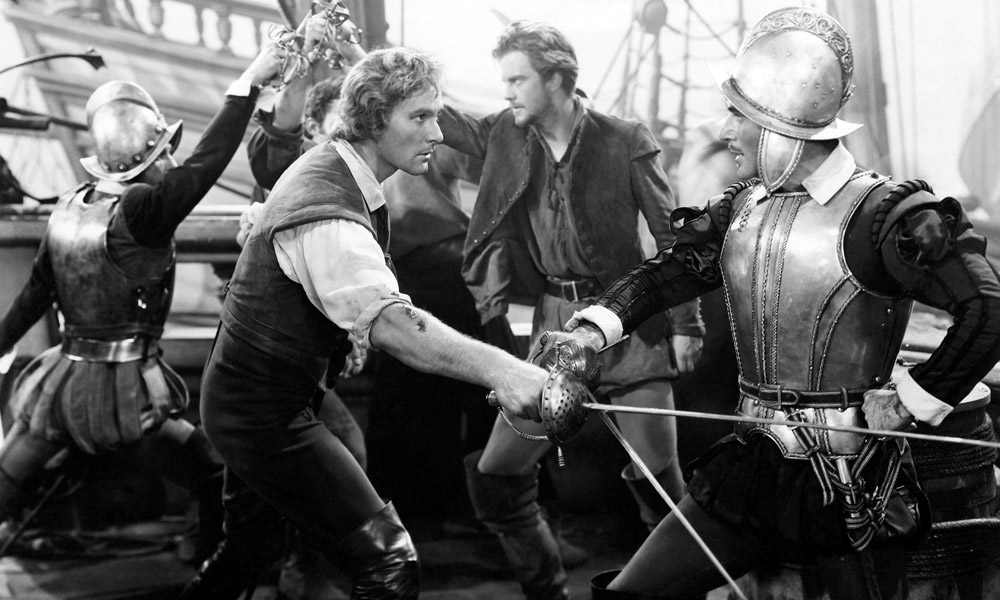Sign up for The Media Today, CJR’s daily newsletter.
“Swashbuckling” is in the news, for different reasons, so it’s a good time to talk about what it really means.
As so often is the case, the answer is: It depends.
If “swashbuckler” conjures images of Errol Flynn deftly wielding a sword to fight for what he believes in, well, that’s partly right. Merriam-Webster’s Collegiate Dictionary defines “swashbuckler” as “a swaggering or daring soldier or adventurer.” In just the past week, The Associated Press has called both the new Pirates of the Caribbean movie and the original Guardians of the Galaxy movie “swashbucklers.” Those seem to fit the Flynn model.
Then there’s Andrew Jackson. President Trump called him a “swashbuckler,” in comments implying that Jackson could have prevented the Civil War (had Jackson not already been dead for nearly two decades). The implication was that, like Captain Jack Sparrow or Vance Astro, Jackson was a daring adventurer.
https://giphy.com/gifs/sinbad-kXIz9eyJojjos
The comment sparked numerous internet memes and articles lampooning Trump’s comments. But he wasn’t as far off the mark as many would have you believe. To begin with, Jackson certainly was a daring soldier, facing down British troops in the War of 1812, despite being severely outnumbered.
Today, “swashbuckler” has heroic overtones (or with Captain Jack Sparrow, anti-hero overtones). That has not always been the case. The original sense of “swashbuckler” was “a swaggering bravo or ruffian; a noisy braggadocio,” The Oxford English Dictionary says, tracing the first usage to 1560. Jackson was known for his quick temper and strong will, which could be considered “braggadocio”—“empty boasting” or “arrogant pretension,” Merriam-Webster says. And many attribute the same qualities to Trump.
The Unabridged Merriam-Webster, in fact, favors the darker definition of “swashbuckler”: “a boasting violently active soldier, adventurer, or ruffian”; “a blustering daredevil.” (Despite sharing many qualities, including staff and publisher, the Collegiate and the Unabridged are separate dictionaries, with separate and sometimes conflicting definitions.)
At least one columnist noted the similarities between Jackson and Trump by the Unabridged definition, writing: “Both are presidential swashbucklers and populists. Their hardscrabble roots may differ, but their attitudes do not.”
M-W’s Words at Play blog noted that lookups for “swashbuckler” jumped more than 6,000 percent after Trump’s remarks. It explains the origin of “swashbuckler” as coming “from combining a sense of the verb swash (‘to act in a blustering and bullying manner’) with the noun buckler (‘a small round shield held by a handle at arm’s length’).” The OED explains it as literally meaning “one who makes a noise by striking his own or his opponent’s shield with his sword.”
Both “swash” and “buckler” have fallen into disuse, but they have their own interesting origins. “Swash” (or “swesh”) was a type of drum when it first appeared in English in the early 16th century, the OED says—so it’s not a stretch to verbify it to mean make a lot of noise, or bluster. “Buckler” as the small shield traces to around 1300, the OED says.
While most of the “swashbucklers” of film and novels are positive figures, or at least sympathetic ones, knowing the word’s darker roots can save you the embarrassment of making fun of a “swashbuckler” who might really have been one.
Has America ever needed a media defender more than now? Help us by joining CJR today.



